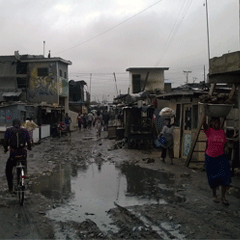|
Call for Papers for the Reducing Urban Poverty 2016 Graduate student Paper Competition, Policy Workshop, and Publication Grand Prize Winner will attend Habitat III in Quito Abstracts Due: 15 May 2016 [16 March 2016] – To encourage a new generation of urban policy makers and promote early career research, Cities Alliance, IHC Global, USAID, the Wilson Center, and the World Bank are co-sponsoring the 7th annual paper competition for graduate students, seeking abstracts on urban poverty in the developing world.
Winning papers will be published and selected authors will be invited to present their work in a policy workshop at the Wilson Center in Washington, D.C. The grand prize winner will receive a travel stipend to attend the United Nations Habitat III Conference in Quito, Ecuador, in October 2016.
Sub-topics
Papers must be linked to one of the following sub-topics:
Climate Change
Cities are grappling with the impacts of a changing climate, and the urban poor are the most adversely affected, especially women and children who experience difficulty in accessing resources, services, and decision-making opportunities. Papers in this category should explore urban adaptation to climate change and identify promising approaches, whether at a regional, city, department, neighborhood, or grassroots level.
Possible topics in this category include: what residents are doing to adapt their neighborhoods to the impacts of climate change; what specific challenges climate change brings to women and how they are responding to such challenges; how cities integrate climate change adaptation into municipal budgets and city halls; and promising solutions such as innovative land-use planning, green technology, and other urban approaches to making communities safer and more prosperous in the face of climate change.
Arrival Cities: Responding to Migrants and Refugees
While not a new phenomenon, current global conflicts are focusing public attention on refugees and migrants, as countries strive to cope with the influx of newcomers. Traditional refugee camps and services are increasingly out of date in today’s urban landscape; policy makers and practitioners alike are struggling with how best to provide assistance to refugees in an urban setting.
Papers on this topic might examine how cities are planning for refugees, evaluate current programs and practices, assess strategies for gender-responsive urban refugee services, examine innovative policies that are dealing with migrants and refugees at the local level; or explore the impact that current policies and programs for refugees and migrants are having on cities as well as their effect on different segments of refugee and migrant communities (i.e., women and men in different age cohorts).
Innovation in Urban Planning
Evidence-based planning is critical for addressing urban challenges and building equitable and sustainable cities and metropolitan regions. Recent advances in technology are enabling better informed decision making and new participatory processes. What tools, methods, and policies are being used by local governments and other institutions to develop consensus to define sustainable approaches to land use, urban investments, and public policy? How are these approaches to planning incorporating the perspectives of all stakeholders and focusing on the needs of the city’s most vulnerable groups? How is innovative planning addressing the needs of women?
Papers on this topic will explore new approaches to urban and metropolitan planning that help stakeholders understand, prioritize, and address urban challenges. Papers might examine innovations such as evidence-based participatory planning and the use of scenario planning with measurable indicators.
Financing Sustainable Urban Development
Investment in sustainable urban development is critical for the future of a rapidly urbanizing world. Growing financing gaps will have a significant impact on economic growth and the quality of life in cities. How are local governments financing infrastructure and services for city residents, particularly the urban poor?
Papers on this topic could explore innovations in mobilizing revenue for urban development, such as public-private partnerships, social enterprise, financing tools and mechanisms, policies to increase women’s access to finance, and the impact of more effective and accountable urban governance. Papers might examine how cities can improve creditworthiness, leverage local assets, and partner with national governments to meet pressing demands for local infrastructure and service delivery.
Process and Timeliine
Eligibility
This call for papers is directed at PhD students and advanced Masters students. To be eligible, applicants must be currently enrolled in a degree program as of May 15, 2016. Papers can be co-authored, if each author is a graduate student. In this case, only one author will attend Habitat III and present at the Washington policy workshop.
Abstract Submissions
Criteria for Selection
Request for Full Papers
Publication
Policy Workshop
Grand Prize: Habitat III
Papers from a variety of perspectives are appropriate, including (but not limited to) urban planning, economics, political science, geography, public policy, law, sociology, environment, anthropology, housing policy, governance, emergency services, and public health.
|
|





